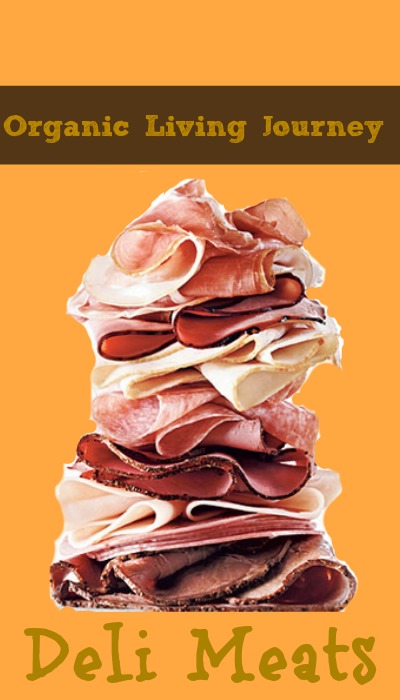This post may contain affiliate links. Read our disclosure here.
The following is part of an Organic Journey Guest Post Series, written by Amy a long time helper behind the scenes of Southern Savers.
I prep lunch for three little ones daily so I must say I appreciate deli meat immensely. Leftovers are scarce in my house (and are normally eaten on the weekend so that I don’t have to cook. Can I get an amen?) and pb&j is off the table due to a child with a severe nut allergy. So, as I learned about nitrites I became increasingly disheartened. Where are my easy deli meats that are good for us? Where is my simple lunch meat that is not overly processed and still affordable? Tonight I went to my Publix and for an hour I read labels, talked to the deli staff, butchers, and even the store manager got involved. After that and a phone call to a leading deli meat manufacturer, here’s what I discovered.
First off, you’ve got to know what you are wanting and what you are wanting to avoid. When you start reading labels promoting different benefits it is easy to forget what they are lacking. It is necessary to walk in well aware of what you want. After learning that nitrites can cause cancer, alzheimer’s, diabetes, and even headaches, I know that this is something that I don’t want to be giving to my family often. I am concerned as well about the overuse of antibiotics given to animals and how that is potentially affecting the growth of superbugs. I also don’t like when my deli turkey has more ingredients listed than pieces of turkey in the package, and I don’t like when half of the ingredients are words I can’t even pronounce. I don’t want mechanically separated meat. It’s disgusting. Remember hearing about pink slime? Yep. That’s mechanically separated stuff. If you read the description of it from the USDA, you won’t want to eat it knowingly again. Promise. So that’s what’s on my deli meat wish list.
While at Publix, I started at the deli counter because my gut says, “more expensive equals better.” Am I the only one that feels that way? I asked which was better, Boar’s Head or the store brand and was quickly answered that Boar’s Head is more nutritious. Boar’s Head will email you a list of all their products that have no nitrites added, which is helpful (though I wish they would just post that information online for all to easily see!). Turns out the bulk of their non-pork products are nitrites added. To me, this is the big advantage of buying Boar’s Head. No fillers, no nitrites added. You still have to read the labels though as dextrose, sugar, and natural flavors were listed on one type that I saw. The downside of the meat available at my deli counter was that it was all conventionally raised meat. There was no organic option. No antibiotic-free choice. No info about what these animals were eating, and where there is no info, I have begun to assume the worst. My thinking is, if you are taking time to do more expensive things to produce a better product, aren’t you going to advertise it to the hilt? And if you aren’t, won’t you just play up your other positives and leave those questions by the wayside?
My next stop was the higher end section of prepackaged deli meat from Boar’s Head and other brands (including the store brand). When I asked what the difference was, I was told that there was no difference at all. Some people don’t want to wait in line for their meat to be cut, so they just grab this and go. Further investigation with another employee rendered a whole different result. In all prepackaged deli meat that I saw, there was some sort of nitrite added (either those found naturally occurring or in the chemical compound form). In order for this meat to be prepackaged it has to be preserved with something. Fillers are used to make the deli meat slice up into pretty circles that are stuck together and not falling apart (can you imagine cutting some Thanksgiving turkey and getting such beautiful slices?). Another clue that preservatives are being used is that this meat will last 1-2 weeks after opening the package. Freshly cut meat from the deli lasts 3 days.
From the higher end of prepackaged meats, I went to the main section of the meat aisle. Mercy. I was assaulted by over a hundred different kinds of deli meat. And friends, I was so discouraged by what I read on the packaging. May we all be mindful that just because it says “all natural” or something similar and costs more, we don’t need to assume that it is good for us. One major brand with a line of “natural” products actually had corn syrup as the second ingredient. We’ve got to read!
I was however, massively encouraged by Applegate’s prepackaged deli meats. The roasted turkey was made with turkey, water, salt and carrageenan (from seaweed). Carrageenan is used to hold the meat together, and from all I can find, there isn’t any big worries in consuming seaweed. Even Applegate’s regular, non-organic line of products is antibiotic free. The cost is comparable to Boar’s Head. I will say though, you really do have to use this meat fast once you open it because it goes bad quickly. A phone call to Applegate confirmed that there are no naturally occurring nitrites in the prepackaged turkey which would explain why it goes bad so fast. So there is a big happy dance happening in our house right now! We found a no nitrites added, antibiotic free, humanely raised deli meat that is affordable. It even goes on sale and you can find coupons too!! I’ve been able to get 7 ounces for $2.50 after a sale and coupons.
So next time you are standing in front of the deli counter or the long aisle of deli meats, here are some questions to ask yourself. How are they preserving this meat? Are there natural occurring or chemical nitrites involved? Can I pronounce the ingredients on the label and do I know what they are? What exactly has the animal that I’m eating been eating? Has that pig, cow, chicken, or turkey been given antibiotics? Am I getting what I’m paying for or am I being suckered by good marketing? And press on, sometimes there is good news at the end of our researching!
Next week, we are going to dive into the world of beef. What’s the big deal about grass-fed beef and why is buying a cow becoming a new trend. For now, what healthy deli meat options do you have where you live?



